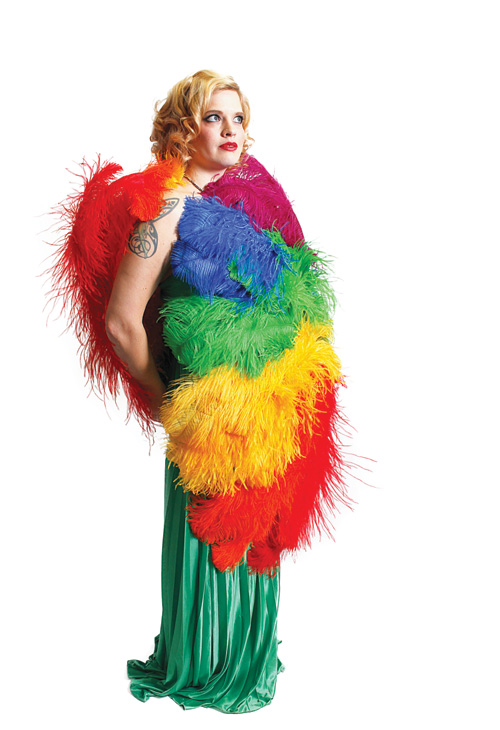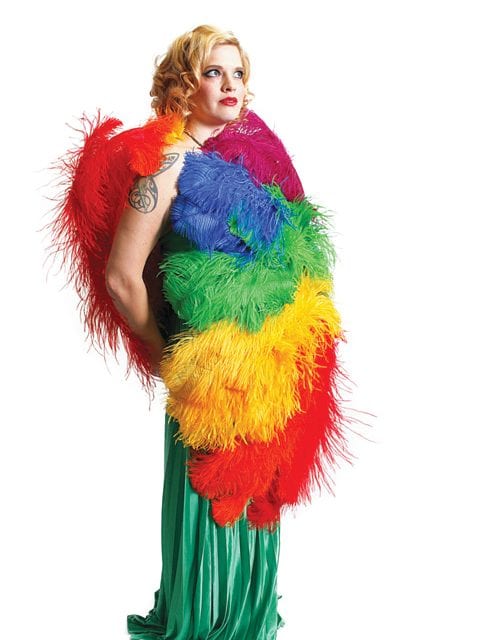Lesbian burlesque star Lillith Grey puts mystery, and sex appeal, into a reemerging performance art form

Lillith Grey discovered burlesque only after an incorrect medical
diagnosis made her self-conscious about her body image, and she sought to remedy that. Photography by Tammye Nash. Hair, makeup and wardrobe styling by Vivienne Vermouth.
For most people, the word “burlesque” conjures up images of vaudeville theaters packed full of rowdy working-class men whooping and whistling as woman struts across a stage, shedding clothing and teasing the audience by manipulating feathery fans to hide her body even as the clothing comes off.
Attend a burlesque show these days in Dallas, and you’ll see the strip and the tease. But the enthusiastic audience is likely to be divided between men and women. And if Lillith Grey is the one onstage, the fans she uses are likely to be rainbow-bright.
Grey isn’t the only lesbian performing in Dallas’ burlesque scene, but then, Grey is more than just a stripper. She is one of the formative forces behind Dallas/Fort Worth’s queer performance scene.
There was a time, though — and not long ago — when Grey couldn’t fathom the idea of baring herself, body and soul, to an audience.
In 2005, she was diagnosed with syringomyelia, a disorder in which a cyst forms within a person’s spinal cord. Doctors told her it was degenerative — and terminal. She was advised to avoid any physical exertion.
Before long, she had become practically bedridden, her life revolving around neurological appointments and medications to try and deaden the pain. She lost her job as a teacher, and because she couldn’t work, she lost her car and apartment, and had to move back in with her parents.
“I had always been a dancer, a performer, and I couldn’t do any of that anymore,” Grey says. “I felt betrayed. I hated my body.”
Eventually, she visited a neurologist at UCLA. “He spent three hours with me,” she recalls. “Three whole hours — more than any other doctor had.
They ran tests. Finally he came in and said to me, ‘I know this will sound like bad news, but you don’t have syringomyelia.’ My life was ruined by that diagnosis. I lost everything and I spent more than a year waiting around to die and now I had found out it wasn’t true.”
When she thought she was dying, there were people willing to take care of her. Without that diagnosis, they expected her to start taking care of herself.
But Grey found herself sinking into a bout of major depression, until a friend named Alissa suggested that perhaps Grey consider having photos done as a way to see herself and her body in a different light.
Grey agreed, and seeing those photos made her realize, “Maybe I am not ugly after all.” She had been approached about becoming one of the Suicide Girls, a group of women with tattoos and a retro pin-up style. But a chance encounter with international fetish performer Angela Ryan took her in another direction: Ryan pointed her instead in the direction of burlesque.
She did her first burlesque performance in 2007 in McAllen “and it was terrible.” But she didn’t give up. “When you live in a body you hate, you find yourself needing to feel seen, needing people to acknowledge your existence,” she says. “I needed someone else to see and appreciate my body.”
Grey, who already had two masters degrees, moved last year to Miami to complete her internship to earn a doctorate in psychology. Combining that educational background with being a feminist and a multiculturalist, she said, allows her to look at burlesque in a whole different light.
“There is a lot of shame, a lot of silencing that happens” around women’s bodies, especially those that don’t fit the mold of the supposed ideal. Burlesque, Grey says, “is a powerful tool in unsilencing women. It is about us getting to reclaim our bodies and our sexuality.”
And in Dallas, she said, burlesque has become “very accessible.”
After her performance in McAllen, Grey continued to practice and perform, perfecting her art of the tease until “I finally got a piece accepted” in a Viva Dallas Burlesque show. Now, she is a regular performer with Viva Dallas and its Cirque de Burlesque show.
In 2011, Grey joined the cast of Mustache Envy, a “community of drag kings and other queer performers who are setting out to re-awaken the art of the drag king in the Dallas/Fort Worth Metroplex,” according to the Mustache Envy website. Grey was emcee for the shows, and the next year she started Panty Raid, a sister show.
“Mustache was very king-oriented, so I tried to emphasize variety and burlesque” in the Panty Raid events, Grey says. She ran Panty Raid independently until January. That’s when she handed it over to Mustache Envy after moving to Florida to complete her master’s degree in counseling.
“I stepped down as producer when I left, and Lily Lovely took over, with me mentoring [her],” Grey says. “[Lily] produced for a year, then mentored Fun Size. [Lily] moved to Portland [earlier this summer], so the July show was Fun Size’s first solo production.”
Mustache and Panty Productions participate in a number of LGBT community events, from fundraising shows to the annual Pride parade. “We have performed at Razzle Dazzle, and [at benefit shows] at SMU and UNT, and at other benefits and events,” she says. “After years of working on committees and boards and dealing with all that mess, it’s really refreshing to be in a group that is super collaborative and drama-free.”
 Mustache Envy shows are held on the first Friday of “even” months — February, April, June, August, October and December. They “tend toward the masculine,” Grey says, but with a femme host and “stage kitten” (the person who picks up the stage after each act and helps with props, etc.).
Mustache Envy shows are held on the first Friday of “even” months — February, April, June, August, October and December. They “tend toward the masculine,” Grey says, but with a femme host and “stage kitten” (the person who picks up the stage after each act and helps with props, etc.).
Panty Raid shows, on the other hand, usually lean more toward burlesque performers and drag queens, “often with masculine types as host and support,” according to Grey. These shows are held on the first Friday of each “odd” month (January, March, May, July, September and November).
“All the shows are theatrical and genderfucky and super glamorous awesome fun!” Grey says.
In March of 2013, the year after she started Panty Raid, Grey decided she wasn’t busy enough, so she started the Tuesday Tease shows at Sue Ellen’s. The Tease, she said, is a “totally separate project” intended to create “a sort of curated open-stage experience for LGBQs and the trans community. There’s a lot of crossover in terms of who is involved, but the production of the Tease is handled completely separately from Mustache/Panty,” Grey says. The Tease is currently produced by Grey,
Vivienne Vermuth (“also known as Vincent Vermuth, depending on the night”) and Buck Wylde.
While she was in Miami, Grey was more hands-off, “but now that I am back, I’ll be working more directly with the shows again,” she says.
Grey and her fellow producers keep the quality level high for Tease shows, making sure to book “big-name headliners” every week. But they also make sure to save room for an entry-level performer and an intermediate performer. The idea is to provide quality entertainment while also giving new performers the opportunity and support needed to get onstage.
“Everyone involved — from the audience to the bar staff to the performers to the producers — brings a really supportive, collaborative energy,” Grey says. “In the dressing room on any given Tuesday, you can find performers of all levels exchanging ideas and supporting and encouraging each other.”
The Tease is “committed to being identity-affirming,” which means that “we actively seek out and create space for people who might not be able to bring their brand of performance to a more mainstream stage,” she says. “We are dedicated to diversity, and we are careful to be sure we cast people of all shapes and sizes and abilities and identities as a rule, not as an exception.”
On top of all that, everyone participating in the shows — cast and crew — gets paid. “It might not be much,” Grey says, “but everybody gets something.”
Another of Grey’s endeavors — The Academy of Queerlesque — can help them make the leap from Tuesdays to Fridays. She and a slate of mentors, including burlesque performers, drag kings, drag queens and more, offer mentorship and education to queer performers looking to advance their skills on stage. Class and mentor fees at the academy of currently donation based, with a suggested donation of $5–$10 per person for classes and $15–$20 an hour for individual sessions with a mentor.
Grey is also looking to restart the Dirty Panties performances again, a monthly series of queer erotica readings she produced before she left for Miami. “We lost our venue, though, and haven’t been able to do it [recently]. It was very popular, though, and I hope we can find a space again now that I’m back,” she says.
And there’s more. Grey used to perform at fetish events — she performed at the last six Dallas Fetish Balls — but has chosen to cut back on performing to focus more on emceeing, mentorship and production. She travels and presents frequently on the conference circuit within the sex positive community, and will be participating in
September at the Catalyst Con West. She leads diversity training and other workshops and works as an interpreter and teacher for the deaf.
“I was the first hearing emcee to emcee entirely in ASL at Deaf Leather in 2012,” Grey says. “I’ve also interpreted for Aerosmith and ZZ Top and for other awesome stuff, too.”
But right now, it is burlesque and queerlesque that holds her attention.
“There is a fierce burlesque community here in Dallas — fierce!” she says. “Without them, I couldn’t have gone to Miami. Viva Dallas Burlesque did a fundraiser for me. And friends set up a fundraising page for me [online at
YouCaring.com], and this community raised $5,000 in two weeks.”
Grey says burlesque is a means of expression that lets her tell the world who she is and what she believes, and a community that gives her the support she needs.
“For me, burlesque is a political statement, every time, no matter what. If I hadn’t come across burlesque when I did, I don’t know where I’d be right now. It saved my life. It certainly saved my relationship with my body.”
Viva Dallas Burlesque, Lakewood Theater, 1825 Abrams Parkway. Performances on the first Friday of each month; next performance: Sept. 5. VivaDallasBurlesque.com.
This article appeared in the Dallas Voice print edition August 15, 2014.
















